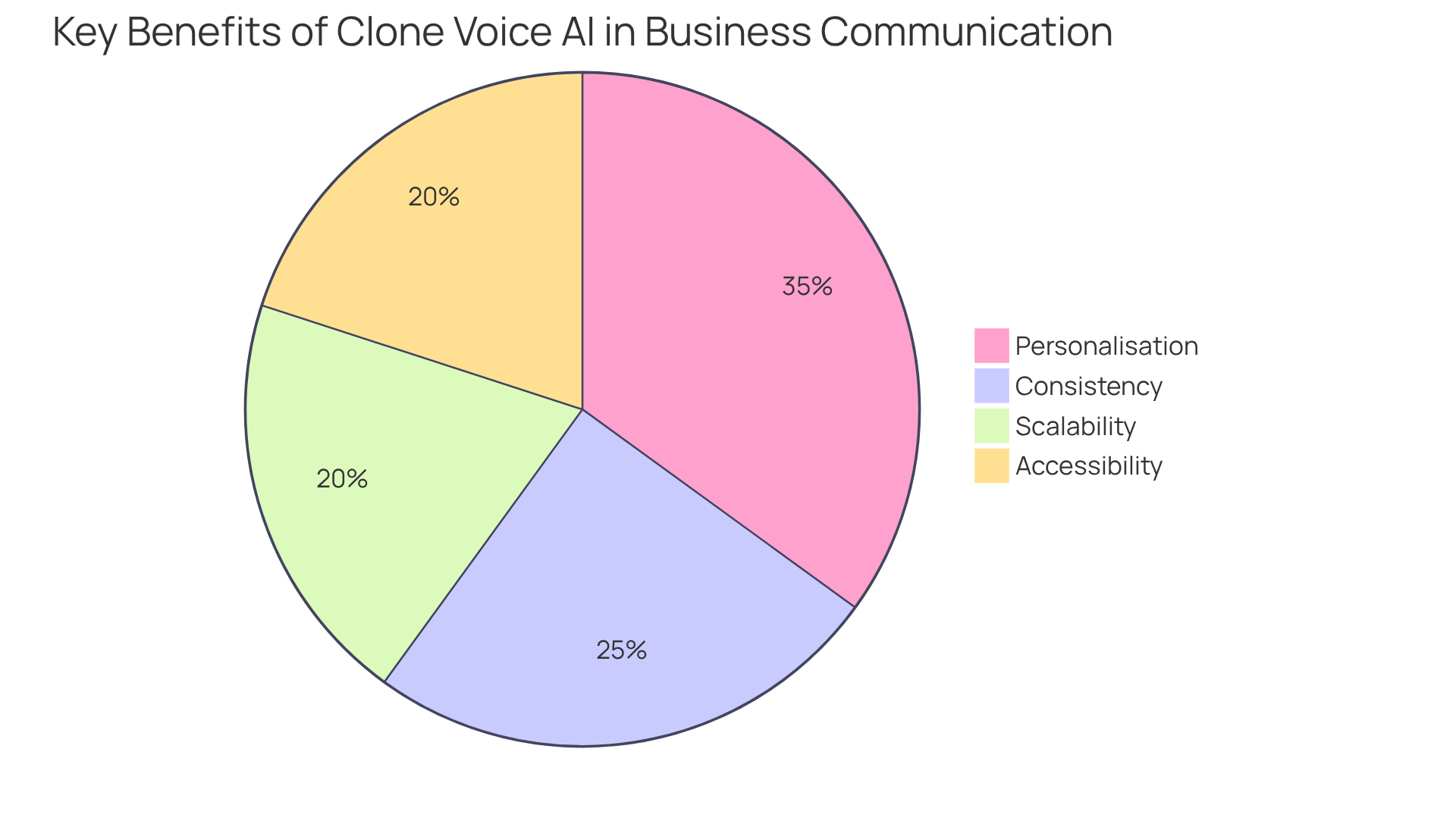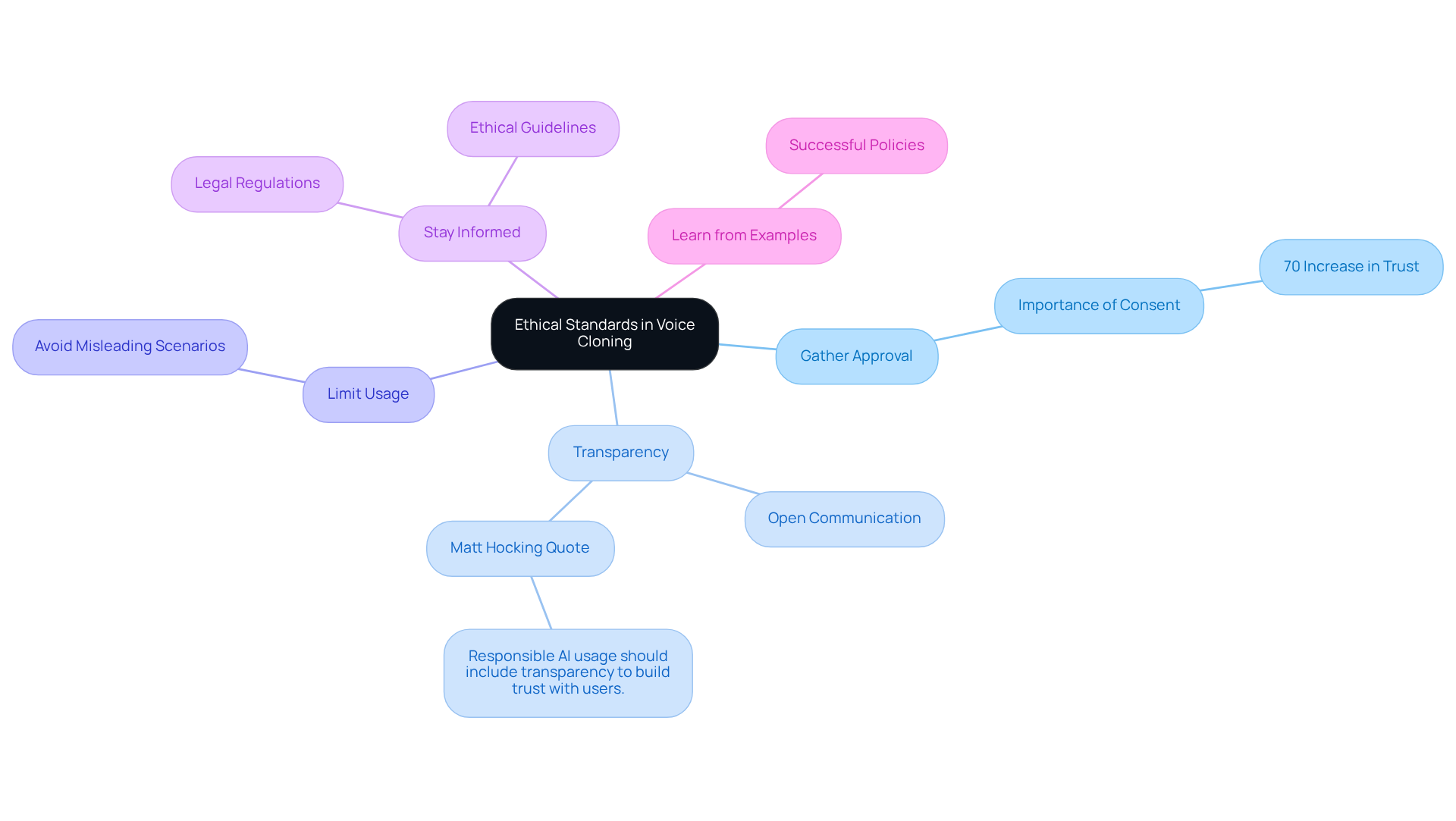
4 Key Practices to Effectively Clone Voice AI for Business
GeneralOverview
The article highlights four essential practises for successfully cloning voice AI in business:
- Personalization
- Consistency
- Scalability
- Ethical considerations
Personalization stands out as a crucial element, supported by evidence that demonstrates how tailored communication can significantly elevate customer engagement and satisfaction. Consistency ensures a reliable brand voice across all platforms, fostering trust and recognition. Scalability allows businesses to adapt and grow, meeting increasing demands without compromising quality. Finally, ethical considerations are paramount; adhering to ethical standards not only builds trust but also mitigates potential misuse of the technology. Together, these practises form a robust framework for leveraging voice AI effectively, emphasising the profound impact they can have on customer relationships and business growth.
Introduction
In a rapidly evolving digital landscape, the emergence of voice cloning technology is fundamentally reshaping how businesses engage with their customers. As companies increasingly seek innovative ways to enhance client interactions, the potential of clone voice AI becomes strikingly apparent, offering personalised communication that can significantly boost satisfaction and loyalty.
However, as this technology gains traction, pressing questions arise regarding its ethical implications and the best practises for implementation. How can businesses effectively harness the power of voice cloning while navigating the challenges it presents?
Understand Voice Cloning Technology and Its Applications
Clone voice ai leverages advanced machine learning algorithms to create a synthetic duplicate of a person’s speech through vocal replication technology. This innovative process analyses audio samples to capture distinct vocal traits, including tone, pitch, and cadence. By 2025, the audio replication industry is poised for significant expansion, driven by the increasing demand for tailored and engaging client experiences. Statistics indicate that companies leveraging speech duplication can enhance service efficiency by up to 30%, leading to improved satisfaction and loyalty.
At the forefront of this revolution, our company offers customised AI solutions that empower businesses to cultivate individualised interactions with clients. The applications of clone voice ai in commerce are diverse, encompassing:
- Automated audio narrations for advertising
- Enhancing client service through virtual aides
For example, businesses can utilise this technology to produce personalised audio narrations for marketing initiatives, ensuring a consistent brand voice across multiple platforms. Furthermore, integrating clone voice ai technology into service chatbots fosters more human-like interactions, significantly boosting client satisfaction.
Industry leaders emphasise that adopting speech replication technology not only improves communication but also strengthens client relationships, ultimately enhancing engagement and retention. Real-world examples illustrate how companies are effectively deploying clone voice ai solutions to create personalised customer experiences, underscoring the technology’s critical role in modern marketing and customer service strategies. However, it is crucial to consider the ethical implications associated with voice replication technology, as these factors can impact its acceptance and public perception.
Identify Benefits of Voice Cloning for Business Communication
Clone voice ai offers a myriad of advantages for business communication, particularly through the innovative solutions provided by Agentics. These benefits can be categorised as follows:
-
Personalisation: Companies can craft tailored messages that resonate with individual clients, significantly enhancing engagement and satisfaction. The platform enables brands to utilise clone voice ai for creating personalised greetings or promotional messages, fostering authentic interactions that nurture deeper relationships with clients.
-
Consistency: A replicated tone ensures that all communications uphold a uniform style, reinforcing brand identity. This consistency is crucial for establishing trust and recognition among customers, as they begin to associate a specific tone with the brand, especially when leveraging advanced AI technologies.
-
Scalability: Audio cloning empowers organisations to produce substantial amounts of sound content swiftly, drastically reducing the time and costs associated with traditional recording methods. This efficiency is particularly beneficial for companies aiming to implement multilingual campaigns or regular updates without the logistical challenges of hiring actors, a process streamlined by Agentics’ clone voice ai technology.
-
Accessibility: Replicated speech can be employed to create content that caters to diverse audiences, including individuals with disabilities. This commitment to inclusivity in communication allows brands to reach a broader audience while enhancing the overall user experience.
Research indicates that customised marketing initiatives can yield revenue growth of 10-15%, underscoring the financial advantages of adopting speech replication technologies. By harnessing these capabilities through Agentics, businesses can significantly elevate customer engagement and satisfaction.

Adhere to Ethical Standards and Best Practices in Voice Cloning
When applying clone voice ai technology, companies must adhere to ethical guidelines to prevent misuse and protect individual rights. Key best practices include:
-
Gather Approval: Always request clear authorization from individuals prior to replicating their speech. This practice not only honors personal rights but also nurtures trust with clients through the use of clone voice ai. Research shows that consumer confidence in clone voice ai applications considerably rises when consent is emphasized, with a reported boost of up to 70% in trust levels among consumers.
-
Transparency: Be open with clients regarding the implementation of audio replication in communications. This transparency fosters trust and mitigates concerns about the authenticity of clone voice ai technology. As Matt Hocking, Executive Chairman of WellSaid Labs, states, “Responsible AI usage should include transparency to build trust with users.”
-
Limit Usage: Use replicated sounds only for the intended purposes and avoid scenarios that could mislead or deceive customers. This approach not only aligns with ethical standards but also protects the brand’s reputation.
-
Stay Informed: Keep abreast of legal regulations and ethical guidelines surrounding audio cloning to ensure compliance and responsible use. For instance, companies such as Respeecher have implemented protocols to obtain consent from audio owners, showcasing a dedication to ethical practices.
-
Learn from Examples: Companies such as [Insert Company Name] have successfully implemented policies requiring written consent from employees before using their audio in marketing materials, thereby safeguarding their rights and promoting ethical practices.
By adopting these best practices, companies can manage the intricacies of clone voice ai technology responsibly, ensuring that they honor individual rights while enhancing their communication strategies.

Integrate Voice Cloning into Existing Communication Frameworks
To effectively integrate clone voice AI into existing communication frameworks, businesses must adhere to key practices, particularly leveraging Agentics’ innovative voice AI solutions.
- Assess Current Systems: Begin by reviewing current communication tools to pinpoint areas where sound replication can enhance functionality. This may encompass customer service platforms, marketing automation tools, or any system that stands to benefit from improved interaction.
- Choose the Right Technology: Selecting a speech replication solution that aligns with business objectives is paramount. The company offers customised audio AI solutions that consider factors such as user-friendliness, scalability, and the level of support provided. The right technology should seamlessly integrate with existing systems to maximise efficiency.
- Train Staff: Providing comprehensive training for employees on the effective use of vocal replication technology is essential. Personnel must be well-versed in the features and limitations of the AI solutions offered by the company to utilise them effectively in their roles.
- Monitor and Optimise: Continuous evaluation of the performance of speech replication applications is vital. Collecting user feedback enables businesses to make necessary adjustments and enhancements, ensuring the technology adapts to evolving needs.
For instance, a company could incorporate Agentics’ vocal replication into its support software, empowering agents to utilise a replicated tone for automated responses. This not only boosts efficiency but also significantly enhances the overall customer experience, showcasing the transformative potential of clone voice AI technology.
Conclusion
In the dynamic realm of digital communication, voice cloning technology emerges as a transformative tool for businesses seeking to elevate customer engagement. By effectively leveraging clone voice AI, companies can craft personalised interactions that not only enhance client satisfaction but also cultivate loyalty. As the industry evolves, grasping the nuances of this technology and its ethical implications is essential for responsible implementation.
The article delineates several key practises that can guide businesses in harnessing voice cloning technology effectively. These practises encompass:
- Understanding the technology’s capabilities
- Acknowledging its benefits—such as personalization and consistency
- Adhering to ethical standards
- Integrating it seamlessly into existing communication frameworks
Each of these elements plays a pivotal role in maximising the potential of voice cloning while safeguarding customer trust and brand reputation.
As the demand for personalised client experiences escalates, businesses are urged to adopt voice cloning technologies thoughtfully and ethically. By doing so, they not only refine their communication strategies but also contribute to a future where technology and human interaction coexist harmoniously. Embracing these practises will empower organisations to stay ahead in a competitive landscape, ultimately leading to strengthened customer relationships and sustainable growth.
Frequently Asked Questions
What is voice cloning technology?
Voice cloning technology uses advanced machine learning algorithms to create a synthetic duplicate of a person’s speech by analysing audio samples to capture distinct vocal traits such as tone, pitch, and cadence.
What is the expected growth of the audio replication industry by 2025?
The audio replication industry is expected to experience significant expansion by 2025, driven by the increasing demand for tailored and engaging client experiences.
How can companies benefit from leveraging speech duplication?
Companies that utilise speech duplication can enhance service efficiency by up to 30%, leading to improved customer satisfaction and loyalty.
What are some applications of clone voice AI in commerce?
Applications of clone voice AI in commerce include automated audio narrations for advertising and enhancing client service through virtual aides.
How can businesses use clone voice AI for marketing?
Businesses can use clone voice AI to produce personalised audio narrations for marketing initiatives, ensuring a consistent brand voice across multiple platforms.
In what way does integrating clone voice AI into service chatbots benefit customer interactions?
Integrating clone voice AI into service chatbots fosters more human-like interactions, significantly boosting client satisfaction.
What impact does adopting speech replication technology have on client relationships?
Adopting speech replication technology improves communication, strengthens client relationships, and enhances engagement and retention.
Are there ethical considerations associated with voice replication technology?
Yes, it is crucial to consider the ethical implications of voice replication technology, as these factors can affect its acceptance and public perception.
Enjoyed this post? Share it with your network!
10 Best AI Sales Tools to Boost Your Team’s Performance

Discover the top 10 best AI sales tools to enhance team performance and drive revenue growth.
Mastering Test Call Numbers: A Step-by-Step Guide for Sales Directors

Elevate your communication with our guide on mastering test call numbers for sales success.
7 Ways Automated Outbound Calls Boost Sales Performance

Discover how automated outbound calls enhance sales performance and streamline communication.
